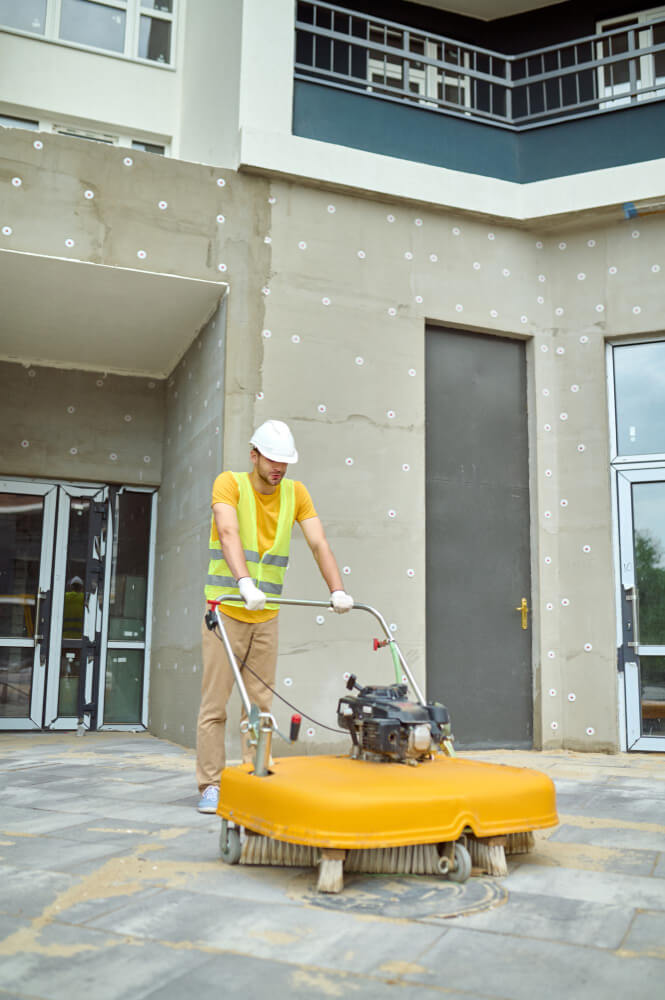Picture this: You’re a go-getter entrepreneur, finally moving your business out of your home office and into a dedicated space.
Armed with your trusty all-purpose cleaner and a roll of paper towels, you set out to tackle the task like you would your own home, unaware of the stark contrast between commercial and residential cleaning.
Hours later, you’re sweaty and frustrated, and the “professional” shine you envisioned is nowhere in sight. Sound familiar?
Commercial Cleaning Has Challenges Unique to Residential Cleaning
While the DIY spirit is admirable, tackling commercial cleaning yourself can be a recipe for disaster. It’s more than just elbow grease and an all-purpose cleaner.
Commercial spaces have unique challenges – high-traffic areas, specialized surfaces, and industry-specific regulations – that require professional expertise and equipment.
It’s tempting to think you can save money by doing the cleaning yourself or even overworking your staff. But the reality is that professional cleaning services can be a cost-effective solution delivering far superior results.
Not only do commercial cleaners have the know-how and tools to get the job done correctly, but they also help free up valuable time to help you scale your business.
#1. Scope and Size
The sheer scale and scope of work is a key difference between commercial and residential cleaning. Commercial spaces are vast and varied and can cover everything from office complexes, retail stores, and casinos to warehouses and medical facilities.
High ceilings, multiple floors, large windows, large floor areas, and varied surfaces are often a key differentiator between these commercial spaces and a typical residential area.
Meanwhile, residential cleaning focuses on a much smaller scale. Think houses, condominium units, or apartments. These spaces have fewer rooms, lower ceilings, and less square footage to cover.
#2. Equipment and Cleaning Materials

Commercial cleaning involves specialized equipment and cleaning solutions that go beyond typical household tools:
- Industrial-grade vacuums can siphon high volumes of debris. Some are equipped with HEPA filters to trap allergens and improve indoor air quality.
- Floor buffers and burnishers: These are used to maintain the shine and durability of hard floors, and remove scruffs, scratches, and stains.
- Carpet extractors: Deep-cleaning machines that use hot water and high-powered suction to remove embedded dirt, stains, and allergens from the carpet.
- Pressure or power washers: Can clean exterior surfaces like sidewalks, parking lots, and building exteriors. Effective on stubborn stains like graffiti.
These tools are a far cry from the Swiffers, rags, or broomsticks you’re all too familiar with when cleaning your home, making commercial cleaning a specialized field that requires the right expertise and resources.
#3. Frequency of Cleaning
Your home might get the occasional spring cleaning treatment once in a while, but this is nothing compared to how frequently commercial areas need to be cleaned. Commercial cleaning is often of a higher frequency, especially for businesses that deal with high foot traffic.
Fast food restaurants, medical facilities, and retail stores for instance need daily or even multiple cleanings per day to maintain a hygienic and clean environment for patrons. These areas demand consistent attention to detail to keep up with daily use.
On the other hand, residential spaces experience lower levels of traffic and activity, which allows for less frequent cleaning. Cleaning once or twice a week is enough to keep an area tidy.
#4. Expertise
Unlike residential cleaners who focus on general cleaning tasks, commercial cleaners need to be proficient in various cleaning techniques, chemical safety, and industry-specific regulations.
Commercial cleaners know the nuances of cleaning various types of surfaces, from delicate fabrics to industrial machinery. They can identify and address potential hazards, like mold, mildew, and biohazards.
Commercial cleaners are also well-versed in OSHA standards, HIPAA compliance for healthcare facilities, and food safety regulations for restaurants. They can create custom cleaning plans that meet specific industry needs.
#5. Cleaning Regulations

Cleaning regulations are in place to help maintain a safe, healthy, and visually appealing environment in any city.
For example in Dallas, cleaning regulations are imposed at multiple levels, including the city, county, state, and federal:
- City of Dallas Code Compliance: Enforces local ordinances to maintain clean properties and address trash disposal and waste management, overgrown shrubbery, and illegal waste dumping.
- Dallas County Health and Human Services: Focuses on public health and sets sanitation and hygiene standards for food establishments and other businesses that serve the public. They also set regulations on pest control, food safety, and waste disposal.
- Texas Department of State Health Services: This state agency establishes broader sanitation and hygiene standards across Texas, often overlapping with local regulations but potentially containing additional requirements.
- Environmental Protection Agency (EPA): At the federal level, the EPA regulates the disposal of hazardous waste, particularly how it is handled, stored, transpired, and disposed of by businesses and industries producing this type of waste.
Residential cleaning regulations, on the other hand, are not as stringent but are still enforced to an extent. They primarily focus on the maintenance of the aesthetic appeal and safety of neighborhoods.
These are typically imposed on a city level. Regulations may include trimming/mowing lawns, removing weeks, proper disposal of household waste, adherence to collection schedules, exterior paints, repairs, and debris removal, among others.
#6. Costs
By now you probably understand why commercial cleaning is much more expensive than residential cleaning. Commercial cleaning costs, for instance, can vary depending on the scope, special requests, frequency, materials used, etc.
Some commercial cleaning companies also offer additional services like floor waxing, carpet cleaning, or window washing which would further drive up the cost.
Residential cleaning quotes tend to be much cheaper, as clients are charged a flat fee per visit. The expense is much more predictable and will vary depending on the size of the home, frequency of cleaning, and additional services requested.
Commercial vs Residential Cleaning: Who Needs What?
Choosing between residential and commercial cleaning depends on the type of property you own. If you run a primarily home-based business and only need cleaning for a small portion of your premises, residential cleaning might be more cost-effective.
But if you’re a preoccupied business owner with a larger commercial space, juggling the demands of your enterprise while ensuring hygiene and cleaning regulations are met can be daunting.
This is where Craddock’s Cleaning Services come to the rescue. As a specialized commercial cleaning company, we understand the unique demands of your business.
We’ll develop a customized cleaning plan that aligns perfectly with your industry’s specific needs and regulations, ensuring a clean, safe, and productive environment for your employees and customers alike.
Request a FREE, no-obligation quote from us today.
